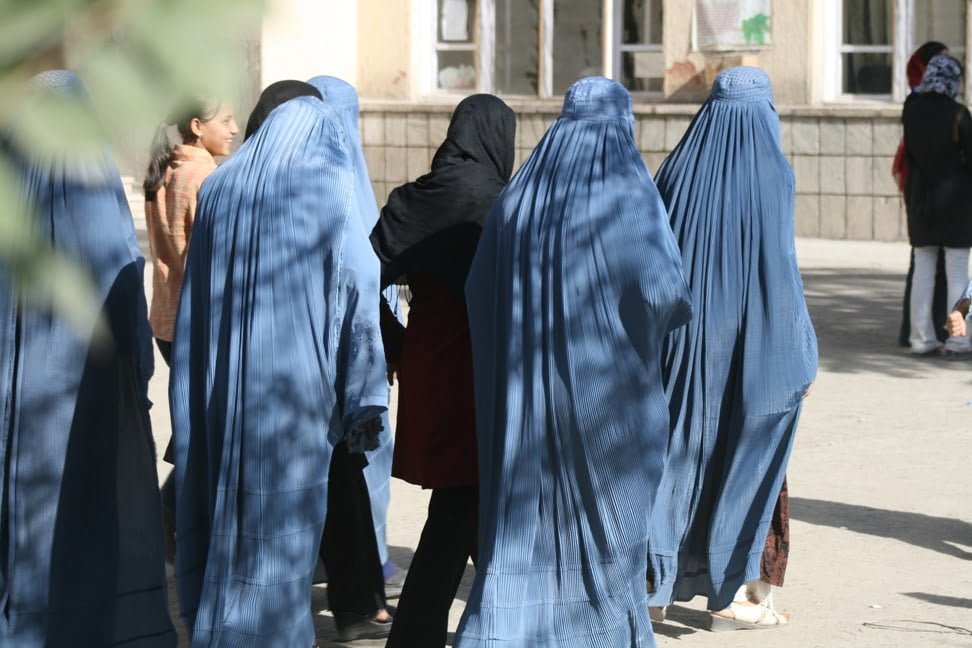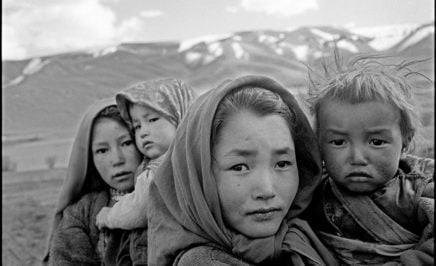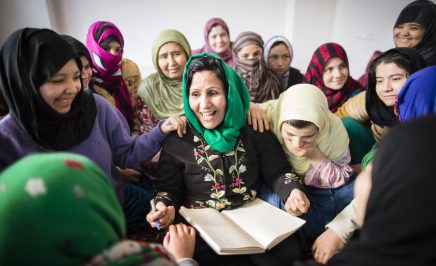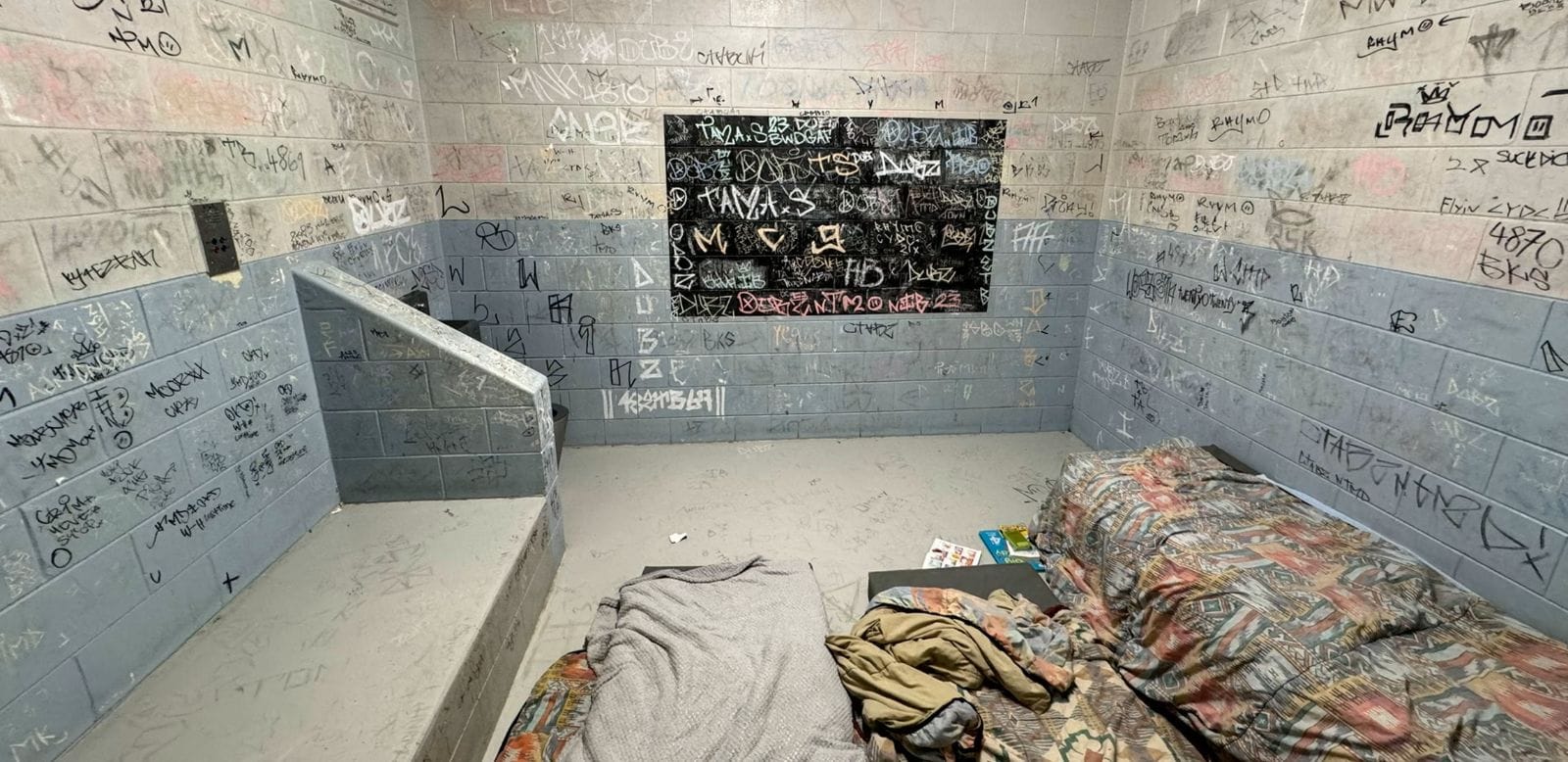Could the results of Afghanistan’s presidential election see the return of the Taliban? And what would that mean for the future of Afghan women?
As 8 candidates battle it out in the Afghanistan presidential election*, women in the country are growing increasingly worried.
Combine an early withdrawal of international forces with the fact that many of those running for power are backed by warlords and fundamentalists who share the Taliban’s hardline views, then, for the women of Afghanistan at least, you’ve got a disaster in the making.
What’s life like for Afghan women right now?
While there have been some gains made since the Taliban was overthrown in 2001, life for women and girls in Afghanistan — particularly in rural areas — is still very difficult.
The few women who have actually been able to make the most of the new opportunities presented to them, such as education and employment, still continue to face inequality and danger at every turn.
Lora Hares, a mother and full time student from Kabul and currently living in Melbourne, worked as a gender specialist in Afghanistan, often received threats because of her work.
“My job was to empower women economically in the country’s rural areas. I received many death threats because working in the government or for an international organisation is very risky for a woman in Afghanistan.”
Lora worked on a national, government-led program with the aim of jump-starting private sector growth in rural Afghanistan. For Lora, this meant visiting women in rural areas to help them start making a living for themselves.
Typically, this was achieved by encouraging the women to form “saving groups” — a group of around 10 to 20 women who would club together to save money on a weekly basis. Each week they would meet and combine whatever they had managed to save — usually the equivalent of up to 50 cents. After doing this for three to six months, members of the group could then apply for a loan from the money saved and use it to start a small business.
“It can be hard for women in rural areas to get employment so with this money they are able to start a very small business using the skills they have. Some women buy a cow with their loan and use the milk to make dairy products like cheese and yoghurt to sell at market.”
However, many rural areas are now back under the control of the Taliban and their influence could continue to expand after the presidential elections, which would put an immediate stop to any dreams of financial independence for Afghan women.
At least girls are being educated now, right?
Yes and no.
According to the Afghan Ministry of Education, the enrolment of pupils has risen from 900,000 in 2001, with few girls, to 10.5 million pupils, of whom 42 per cent (4.4 million) are girls.
Although this is a great achievement, the vast majority of girls still leave school when they are between 12 and 14 years old, often due to family pressure, and the fact that it is deemed unacceptable for girls to be taught by a man unless women are present…but there’s a shortage of female teachers.
However, while the challenges currently faced by Afghan women and girls are huge, they are nothing compared to a return to the Taliban-era repression of old.
Wait a minute, is that a possibility?
A scary thought, but the answer is yes. The Taliban’s star could once again be on the rise.
In February this year, it was widely reported that President Karzai was having clandestine chats with the Taliban in an attempt to broker a peace deal before his term in office expires.
Plans to sign a security pact with the US, allowing some troops to remain in Afghanistan beyond 2014, were put on hold by Karzai whose condition for signing is that the US re-start peace talks with the Taliban. Whereas the Taliban have long said that getting rid of foreign troops is one of their main aims.
Lora is concerned that the situation is already getting worse for Afghan women.
“The process of peace talks with the Taliban has really worried a lot of women. The Taliban’s agenda towards women, prior to 2001, deprived women of all their basic human rights.
Women are really afraid about what might happen to them if the Taliban is reconciled into the future government and able to push for their anti-women agendas to be implemented.”
What would this mean for Afghan women?
In a nutshell: a complete decline in rights and return to the days of the Taliban’s extreme interpretation of the law.
Worryingly, we are beginning to see an impact on women’s rights in the country and there already seems to be a surge in the number of violent attacks against women.
Despite living in Australia, Lora closely follows the rise in violence against women in her home country.
“There was a 25 per cent increasein violence against women in Afghanistan in 2013 alone. When I heard the news about the woman whose husband cut off her nose and lips, I realised just how bad the situation is getting for women in Afghanistan.”
Once again, women are uncertain about their future in Afghanistan.
“International troops are leaving and the country is going into political transition with the elections. A lot of women are very worried about their future.”
So, will the Afghan people actually vote?
We won’t know until the day.
Casting a ballot involves hours of travelling and serious risks for many Afghans, including the increasing likelihood of attacks on polling stations by the Taliban who believe it is “the religious obligation of every Afghan to fulfil their duty by foiling the latest plot of the invaders that is guised in the garb of elections.”
So with little guarantee of personal safety, it’s unclear how many people will turn up to vote.
It is unlikely that women in rural areas will vote, so vice-presidential candidate Habiba Sarabi, the first woman to run for such a high office in Afghanistan, is appealing to young, urban and educated voters to prevent the possibility of power going to Islamist extremists.
What should happen next for Afghan women?
There are many brave women, like Lora, who will never give up fighting for the rights of women and girls in Afghanistan. And most will remain in Afghanistan, even if that means facing danger and persecution, to do so.
“Living in Afghanistan and being an Afghan woman myself, I am driven to improve the lives of women in my country. I want to make Afghanistan a better place for my daughter’s generation.”
The kind of work Lora does is vital in improving the rights of women and girls in Afghanistan but support for women’s rights need to exist in practice, everywhere. And serious changes must be made by those in power to ensure the economic growth of women.
Lora believes the rest of the world can help achieve this goal.
“There’s a lot the international community, including the Australian Government, can do for the women of Afghanistan. They can help to fund education for women and push the government in Afghanistan to take seriously the issues of Afghan women.”
*The Afghan presidential election takes place on Saturday 5 April 2014.
Article by Katie Young, Online Editor









